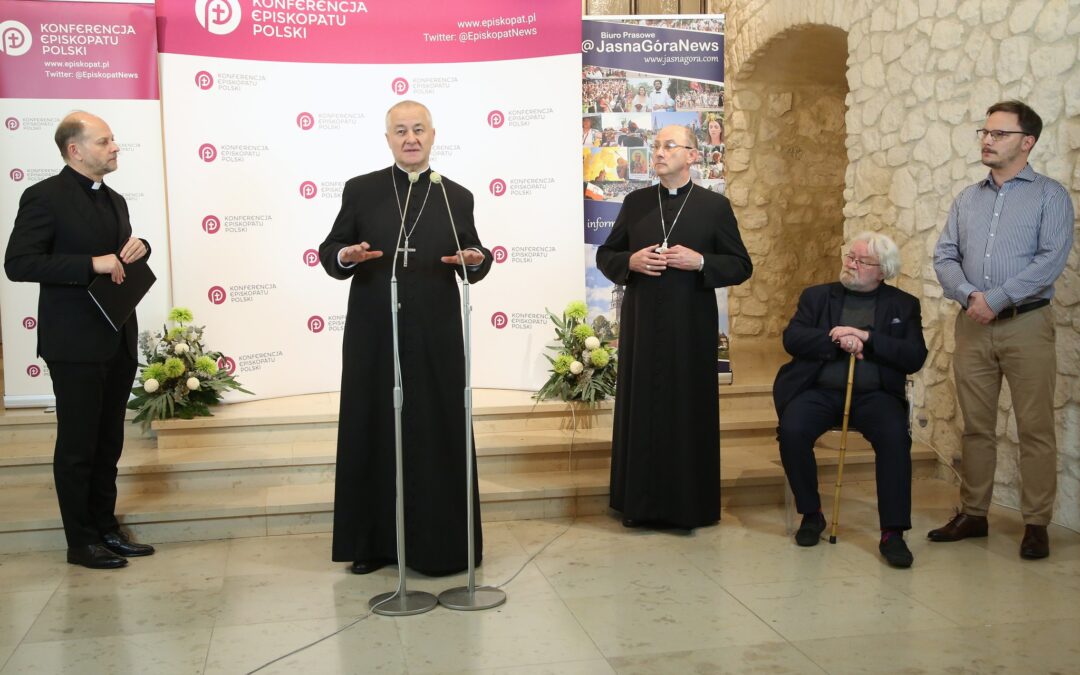Keep our news free from ads and paywalls by making a donation to support our work!

Notes from Poland is run by a small editorial team and is published by an independent, non-profit foundation that is funded through donations from our readers. We cannot do what we do without your support.
Poland’s bishops have met with survivors of sexual abuse by Catholic clergymen for talks on the church’s handling of the issue, with one of the victims hailing the development as “historic”.
Victims were represented at the meeting by Jakub Pankowiak, Robert Fidura and Tośka Szewczyk, all of whom are themselves survivors of sexual abuse by members of the clergy.
The unprecedented meeting took place after the annual plenary session of the Polish Bishops’ Conference (KEP), the central organ of the Roman Catholic church in Poland, at Jasna Góra monastery, which is home to Poland’s holiest Catholic shrine.
“I feel that the meeting was historic,” said Pankowiak, quoted by Polskie Radio. “We were finally able to be partners in conversation and present our expectations for our church.”
#Zdjęcia z briefingu po spotkaniu biskupów z przedstawicielami osób skrzywdzonych są dostępne na #flickr #EpiskopatNews: https://t.co/80pGa82Wxq pic.twitter.com/ox6QKdWfTn
— EpiskopatNews (@EpiskopatNews) November 19, 2024
Over 70% of people in Poland identify as Catholics, according to the latest national census. But the church has faced mounting criticism in recent years over its negligence in dealing with cases of sexual abuse by members of the clergy.
While individual bishops have previously met with survivors, this week was the first time the KEP convened a formal discussion with a larger group, reports journalist Tomasz Krzyżak of Rzeczpospolita, a leading daily.
He notes that the church hierarchs have publicly condemned abuse, created systems to prevent it and support victims, and have apologised for cases of negligence. But until now “they avoided face-to-face conversations in a large group”, he added.
The Vatican has announced the resignation of a Polish bishop due to his negligence in handling child sex abuse cases
A leading Catholic commentator in Poland has criticised the church for letting the bishop go into retirement rather than facing punishment https://t.co/dACUfaVl3E
— Notes from Poland 🇵🇱 (@notesfrompoland) March 11, 2024
Archbishop Wojciech Polak, the Primate of Poland and the KEP’s delegate for the protection of children and young people, also underscored the significance of the dialogue.
“We experience again and again this truth that the harm in the church by certain clergy is not only about the application of the law…but centres around the harm suffered by certain brothers of ours,” he said.
The personal testimonies shared during the meeting deeply moved the bishops and brought “light from the darkness of sin”, he added.
The representatives of the victims also positively evaluated the meeting. Fidura described it as “very emotional” and marked by “great openness and sincerity”. He expressed hope for continued dialogue and cooperation.
“I am extremely grateful that…we are starting to move in one direction, we are starting to look at certain things very similarly,” said Fidura.
Pankowiak noted that the meeting was the first time that victims had had a chance to speak with most bishops at once and express their “very specific expectations”, some of which “it seems at times [are] probably difficult to accept as far as the bishops are concerned”.
After a report indicated over 1,000 victims of child sex abuse by priests in communist Poland, a bishop admits the church was "naive in dealing with these crimes"
But he also notes the communists exploited the issue to blackmail priests into collaborating https://t.co/NfXywWnPkK
— Notes from Poland 🇵🇱 (@notesfrompoland) May 19, 2023
Catholic weekly Tygodnik Powszechny notes that the meeting between the delegation of victims and the bishops was one of eight demands expressed in a letter sent to the KEP in May.
Others included the suspension of Tadeusz Wojda, the head of the KEP, for alleged negligence in investigating abuse cases during his time as archbishop of Gdańsk.
The survivors also want changes to canon law that would grant them the legal status of a victim rather than witnesses in their own cases in church proceedings, allowing them to be informed of case progress, file motions for evidence, and appeal decisions.
Another demand is the establishment of an independent commission to investigate abuse cases within the church dating back to 1945. Similar bodies have been set up in countries like France and Germany, where they included independent experts such as lawyers and sociologists.
The head of Poland’s Catholic church has been accused of negligence in dealing with sex abuse. In one case, he allegedly said no abuse occurred because “it was just groping”.
But the archbishop's spokesman says the claims are “fragmentary” and “distorted” https://t.co/kVFGUiRERw
— Notes from Poland 🇵🇱 (@notesfrompoland) May 13, 2024
The victims have also called for the appointment of a Commissioner for the Rights of the Wronged in the Church and greater involvement of women in diocesan support structures.
Commentators have largely praised this week’s meeting for its symbolic value but have also noted a lack of tangible outcomes. Marcin Gutowski, a reporter with broadcaster TVN24’s investigative series Czarno na Białym, said “no specific actions were taken” as a result of the meeting.
He emphasised that the victims’ representatives attended the meeting not only to share their experiences but also to address specific demands. Gutowski also highlighted the ambiguous structure of the meeting, describing it as occurring “in an unclear format.”

Notes from Poland is run by a small editorial team and published by an independent, non-profit foundation that is funded through donations from our readers. We cannot do what we do without your support.
Main image credit: KEP/Flickr (under CC BY-NC-SA 2.0)

Alicja Ptak is deputy editor-in-chief of Notes from Poland and a multimedia journalist. She has written for Clean Energy Wire and The Times, and she hosts her own podcast, The Warsaw Wire, on Poland’s economy and energy sector. She previously worked for Reuters.



















